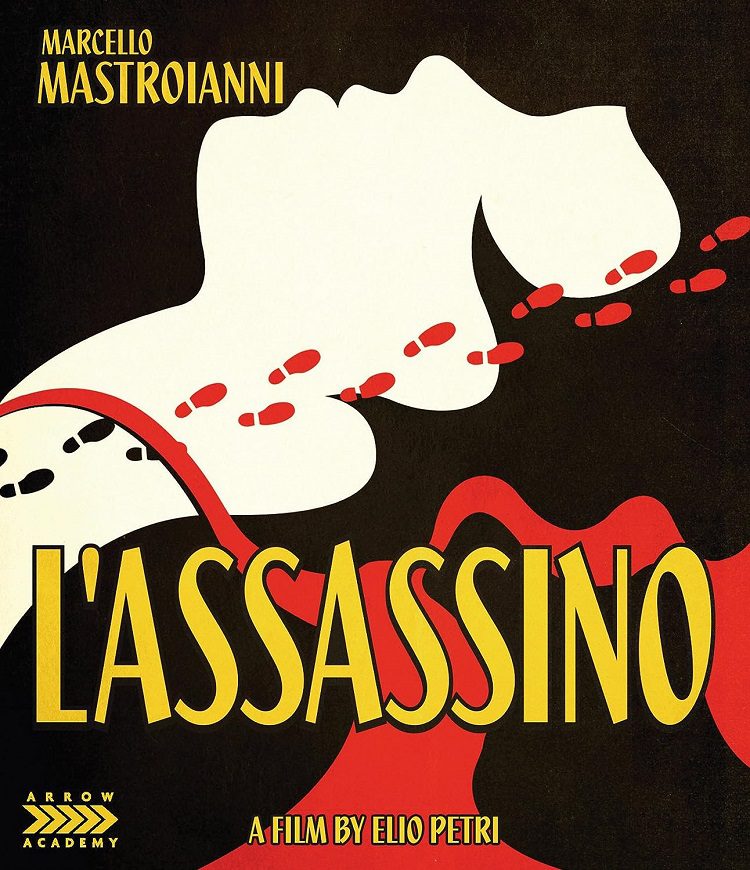
The first feature film from Property Is No Longer a Theft director Elio Petri, The Assassin (L’assassino) is an interesting, early test run for the filmmaker’s later (and better known) 1970 hit Investigation of a Citizen Above Suspicion by way of Franz Kafka’s The Trial. Albeit a very Elio Petri fashion, of course. Interestingly, some Italo movie aficionados around the globe see The Assassin as something of a proto-giallo, as many elements would later become staples in the gialli movement. It also, coincidentally enough, features a character similar to legendary TV detective Columbo, a year after the character first appeared on-screen in an episode of The Chevy Mystery Show.
Here, Italy’s answer to Louis Jourdan, the late great Marcello Mastroianni himself, stars as an antique dealer of dubious scruples who finds himself the unwanted center of attention when a group of humorless policemen walk into his home and “invite” him to join them at the station. After hours of being held without explanation, Alfredo Martelli (Mastroianni) finally gets to meet the brains behind the weird set-up: a polite enough (but extremely shrewd) detective in a trenchcoat who is named Palumbo (Salvo Randone), who informs Martelli his former business partner, regular financier, and part time lover (Micheline Presle) has been murdered. Talk about tact, right?
Naturally, the police suspect Martelli of the crime, despite there being no definitive evidence, genuine motive, or ‒ and most frustrating of all ‒ an actual charge. Rather, it would seem that the only true topic of interest to the police is the increasingly hedonistic and amoralistic lifestyle the ’60s set the stage for. The actual crime that has been committed is not important. Instead, Martelli is locked up with a variety of planted kooks in an archaic jail cell. At least, I think it’s supposed to be archaic: it may be quite fashionable by early ’60s Italian standards, as Petri constantly likes to remind us his country had just gone through a drastic shift in politics.
And that in turn permits Petri to unfold his non-linear tale of a man who may or may not have committed a heinous deed; an act of violence which never seems to be a subject of true importance. In-between the film’s many flashback segments, wherein we bear witness to the true story of Martelli’s relationship with his dearly-departed acquaintance, Petri tosses in more of his less-than-subtle political policies, garnished with a heavy dose of black humor. The actual story doesn’t matter too terribly much: Petri’s social/political commentary relays its message concisely, leaving the viewer little else to do than to take in the sights and sounds our auteur in the making has woven.
In this instance, that means excellent photography by Carlo Di Palma and a jazzy score by Piero Piccioni. In fact, the talents of Petri’s entire crew ‒ especially the aforementioned Di Palma (who would later become a frequent collaborator with Woody Allen) and Piccioni (providing one of his earliest of several hundred scores) ‒ are just as much the stars of the film as are Marcello Mastroianni and his sunglasses (which make him look almost indistinguishable from Louis Jourdan, interestingly enough). And this on/off-screen combination makes for enjoyable viewing ‒ even if we are frequently uncertain as to what’s really going on.
Originally titled The Lady Killer of Rome for its initial American release, The Assassin returns to bewilder and delight courtesy the recently sprouted US branch of Britain’s Arrow Academy. Presented in a gorgeous widescreen transfer, L’assassino was scanned in 2k from a mostly complete original camera negative, with the first and last reels hailing from a rather well-preserved (or at least, restored) interpositive. The difference is noticeable, but not particularly distracting ‒ unlike several instances where the image briefly fades to black, which appear to not have been part of Petri’s initial design (this was my first viewing, so I have no basis of comparison).
Sadly, The Assassin makes its home video debut in the U.S. without the English-dubbed audio track moviegoers in the early ’60s heard. Of course, from what I have read, many things were lost in translation in the English-language version, so the original Italian LPCM Mono soundtrack is more than satisfactory. Said audio comes through without a hitch, the optional English subtitles are easy to read and, more importantly, properly translated. And since The Assassin is a movie that relies just as much on its dialogue as its visuals, that’s a blessing. It certainly doesn’t hurt when Piccioni’s fab-a-roo jazz score kicks in, wherein you’ll want to crank it up.
Additional special features for this release include an interview from 2014 with cinema historian Pasquale Iannone, who tells us a little bit about Elio Petri’s work. Next up is an Italian television documentary from 2008 about screenwriter Tonino Guerra, which runs just shy of an hour in length, and both extras contain English subtitles. Finally, Arrow Academy’s Blu-ray/DVD combo brings us the original Italian theatrical trailer for this seldom-seen (in the US) classic, along with liner notes by Camilla Zamboni, though the booklet they are contained within will only be made available for first pressings of this recommended release.
Enjoy.